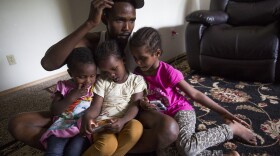-
For many refugees, the first year can feel like a race against the clock to set up a new life.You get a little cash up front and a few months of help from…
-
Tu Tu is his full name, because Burmese people don't use last names.He is 20 when he arrives in Seattle. With his long bangs and torn jeans, he looks…
-
The couple won't say why they left Iran.Did something bad happen?"Yes," Peiman Karimi, the husband, says. "Not me. To Neda.”Neda Sharifi Khalafabadi says…
-
A refugee move to Seattle.He thought it would be paradise.Instead, he found guns, violence and struggle.
-
“Sincerely, if I told you the truth, you cannot achieve or reach your aim if you don’t struggle. So now, I’m struggling.”Those are the words of Osman…
-
Bill Radke speaks with Sarah Peterson, Chief of the Office of Refugee and Immigrant Assistance at the Department of Social and Health Services, about the…
-
Kim Malcolm speaks with Nicky Smith, executive director of International Rescue Committee in Seattle, about the challenges and struggles of resettling…
-
Bill Radke speaks with Andrew Kritovich, program director of international counseling and community services at Lutheran Community Services NW, about the…
-
Osman Mohamed, of Somalia.For many refugees, the first year can feel like a race against the clock to set up a new life.You get a little cash up front and a few months of help from a social worker.Then, you’re mostly on your own.We followed three refugee arrivals, from touchdown at Sea-Tac Airport to eight months into their lives here. Eight months, because that’s when refugees without families stop receiving small federal payments.Their stories are as different as the countries they come from, but they start with a similar thread – leaving despair behind and grasping for hope. Listen to our one-hour special (mp3)http://cpa.ds.npr.org/kuow/audio/2017/01/1124-REFUGEE-SPECIAL.mp3
-
Bill Radke speaks with KUOW's race and culture reporter Liz Jones about her series about refugee resettlement in the Puget Sound region. Jones tracked…
Play Live Radio
Next Up:
0:00
0:00
Available On Air Stations









